|
|
|
Sort Order |
|
|
|
Items / Page
|
|
|
|
|
|
|
| Srl | Item |
| 1 |
ID:
122392
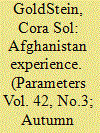

|
|
|
|
|
| Publication |
2012.
|
| Summary/Abstract |
On 7 October 2001, the Bush administration launched Operation Enduring
Freedom (OEF) to dislodge al Qaeda forces, neutralize the Taliban in
Afghanistan, and decapitate their respective leadership. President Bush insisted
that the United States was not at war with the Afghan people or with Islam,
and the Afghan civilian population was not identified as the enemy. Therefore,
the Pentagon attempted to minimize civilian casualties. OEF toppled the
Taliban regime, but did not eliminate the Taliban influence in Afghanistan. The
Taliban, although expelled from power, still preserved connections with the
rural Pashtun.
|
|
|
|
|
|
|
|
|
|
|
|
|
|
|
|
| 2 |
ID:
144173
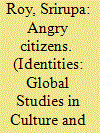

|
|
|
|
|
| Summary/Abstract |
This article examines the emergence of the angry citizen as a legitimate political actor in post-colonial Indian democracy. Approaching such ‘civic anger’ as a historically constituted and socio-politically embedded formation rather than as a subjectively and individually experienced feeling, I show that the rise of the angry citizen was linked to the consolidation of a distinctive politics of curative democracy in the ‘long 1970s’. The lineages of the civic anger of twenty-first century India may be traced to this older formation of curative democracy. The point here is not to offer a chronological revision of the origins of ‘new India’, but to consider the generalisable political implications of the idea of curative democracy, and to identify the distinctive forms of political agency that are associated with the call to cure, reform or renew democracy.
|
|
|
|
|
|
|
|
|
|
|
|
|
|
|
|
| 3 |
ID:
110117
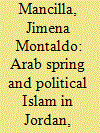

|
|
|
| 4 |
ID:
130443
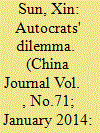

|
|
|
|
|
| Publication |
2014.
|
| Summary/Abstract |
How do authoritarian elections affect voters' attitudes toward the regime and their support for democracy? This article draws upon the case of village elections in China to argue that elections may have two simultaneous effects. First, free and fair elections increase citizens' confidence in the government. Second, elections also allow voters to exercise political rights and accumulate democratic experience through participation, and this in turn may trigger greater demand for further empowerment. Empirical analysis of data from a two-round nationwide survey conducted in 114 villages confirms both effects. One implication of these findings is that competitive elections may simultaneously boost regime popularity and increase public demand for further democratic reform.
|
|
|
|
|
|
|
|
|
|
|
|
|
|
|
|
| 5 |
ID:
140315
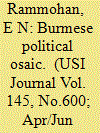

|
|
|
| 6 |
ID:
127451
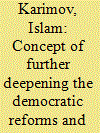

|
|
|
| 7 |
ID:
116629
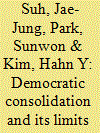

|
|
|
|
|
| Publication |
2012.
|
| Summary/Abstract |
This article uses dilemmas of cooptation to explain progress and limits in South Korea's democratic consolidation since its transition to democracy in 1987. The series of cooptations employed by both conservative and liberal forces has helped to consolidate democracy but also to limit the extent of democratic reforms.
|
|
|
|
|
|
|
|
|
|
|
|
|
|
|
|
| 8 |
ID:
073127
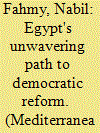

|
|
|
| 9 |
ID:
116837
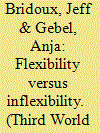

|
|
|
|
|
| Publication |
2012.
|
| Summary/Abstract |
This article analyses US discourses on democracy promotion and anti-corruption strategies. The analysis shows that there is a cosmetic agreement in these discourses on notions of the good society that identify democracy as a good thing and corruption as a bad thing. However, despite this agreement, there are differences in the discourses on the measures recommended to promote democracy and fight corruption that may lead to policies and processes pulling in opposite directions. This discrepancy arises, on the one hand, from a mode of operation of democracy promotion that is flexible and adaptable to various contexts and, on the other hand, from the uncompromising and inflexible language of anti-corruption policies that threatens to 'undo' what US democracy promotion's rhetoric aims to achieve: ownership and sustainability of democratic reforms through re-empowering the state.
|
|
|
|
|
|
|
|
|
|
|
|
|
|
|
|
| 10 |
ID:
134380
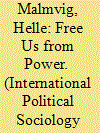

|
|
|
|
|
| Summary/Abstract |
For over a decade, Arab governments have been enrolled into EU initiatives aimed at promoting democratic reform in the region. Common to these initiatives are their claims to be uninvolved with power and external imposition, professing instead to be based on voluntary notions of local demand and ownership. This article challenges this core liberalist assumption of the absence of power. Drawing on Foucault's reflections on liberal governmentality, it shows how power operates through a technology of “contractualization” which produces a distinct Arab subjectivity in the form of a lack (of reform will). Yet governing technologies are never complete, and possibilities of reversal and resistance always exist. In the second part, the article engages with the emerging debate on Foucault's concept of counter-conduct, opening up the concept to more subtle and less spectacular forms of resistance. Drawing inspiration from Derrida's analysis of (in)hospitality and Baudrillard's logic of simulation, the article shows how the liberal assumptions of “invitation,” “ownership,” and “gradualism” inherent in European reform initiatives enable resistance in the form of: (i) selection of entry; (ii) setting conditions; and (iii) simulating reform.
|
|
|
|
|
|
|
|
|
|
|
|
|
|
|
|
| 11 |
ID:
104680
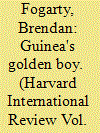

|
|
|
| 12 |
ID:
110160
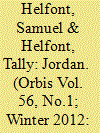

|
|
|
|
|
| Publication |
2012.
|
| Summary/Abstract |
The Arab Spring has fundamentally shifted the strategic balance in the Middle East. As all sides rush to ensure that their interests will be secured, the Hashemite Kingdom of Jordan has emerged as a key battleground between those who would like to see a more democratic region, and those who would like to maintain economic stability. On one side of this debate is the Gulf Cooperation Council, led by Saudi Arabia, that views democratic reform as a threat to economic stability. On the other side are the forces of the Arab Spring, which have called for political reform in states such as Egypt, Syria, and Libya, even if these reforms come at the expense of stability. This article examines the various forces, both domestic and international, that are attempting to influence Jordan, and through it, the balance of power in the Arab World.
The uprisings in the Arab world have not only upended domestic politics in individual states where protests have taken place, they have also served as a catalyst for transforming international relations in the Middle East. The Arab Spring has sent policymakers on all sides scrambling to ensure that the new regional order will be in line with their interests. The regimes that fell in Egypt and Tunisia were pillars of a moderate Sunni bloc that was allied with the United States and felt threatened by both Iran's bid for regional hegemony as well as Islamist and/or democratic reform movements domestically. The leaders of this moderate Sunni bloc, which also includes Saudi Arabia, the Gulf States, and Jordan, were alarmed by American support for the protest movements that ousted the Mubarak and Ben Ali regimes from Egypt and Tunisia respectively. The remaining states in this bloc have since circled their wagons, and are working to build a durable political/military alliance that is capable of withstanding the destabilizing trends associated with the Arab Spring.
However, unlike the wealthy Gulf Arab states, which now form the core of this truncated bloc, Jordan is poor and has always been more culturally and politically tied to the states of the Mediterranean Basin. Thus, the pull of the Arab Spring, which engulfed Egypt, Syria, and other Mediterranean states, has been much stronger in Jordan than it has in most of the Gulf Arab States (the major exception being Bahrain). Jordan, therefore, finds itself caught between two competing forces. On one side are the Sunni Monarchies of the Gulf, which wish to maintain regional economic and political stability and have attempted to bolster the Jordanian regime by recently inviting it to join the Gulf Cooperation Council (GCC). The other side presents pressures of political reform associated with the Arab Spring that have spread throughout the Mediterranean Basin. As an unexpected result, the small Arab Kingdom of Jordan has become a strategic battleground between those who want to see a more democratic region, and those who want to maintain the status quo. Nevertheless, the domestic politics of Jordan will undoubtedly decide in which direction Jordan heads. Political divisions inside Jordan have thus suddenly become very important to the future of the whole region.
|
|
|
|
|
|
|
|
|
|
|
|
|
|
|
|
| 13 |
ID:
073078
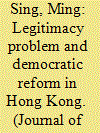

|
|
|
| 14 |
ID:
130229
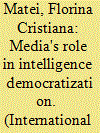

|
|
|
|
|
| Publication |
2014.
|
| Summary/Abstract |
In their path toward democratic consolidation, emerging democracies endeavor to ensure the democratic transfer of political power, bring changes in the legal framework, transform their executive, legislative, and judicial systems, boost free market economy, and develop robust and functional civil societies. They also institutionalize democratic civil-military relations (CMR) by establishing new security institutions-military, police, and intelligence agencies-that are under democratic civilian control, effective, and efficient. Of these many tasks, the democratization of intelligence agencies is by far the most daunting, as effectiveness and efficiency involve secrecy, while democratic control implies transparency, openness, and accountability. Nevertheless, democratic reform of intelligence in new democracies, though difficult, is not impossible, if and when civilians are interested and willing to "invest" in intelligence and intelligence reform. The contribution of external factors, such as media, 2 civil society, international groups, and individuals involved in human rights, may also be instrumental in achieving a balance between control and effectiveness of intelligence
|
|
|
|
|
|
|
|
|
|
|
|
|
|
|
|
| 15 |
ID:
165948
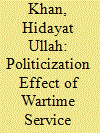

|
|
|
|
|
| Summary/Abstract |
This article explores who among the citizens in the former Federally Administrated Tribal Areas (FATA) of Pakistan is in favor of democratic reforms. Empirical analyses reveal that the government’s wartime service provision politicized citizens and framed their attitude toward the issues of FATA’s jurisdiction and the Frontier Crimes Regulation.
|
|
|
|
|
|
|
|
|
|
|
|
|
|
|
|
| 16 |
ID:
038749


|
|
|
|
|
| Publication |
London, Collins, 1974.
|
| Description |
xv, 254p.hbk
|
| Standard Number |
0002118424
|
|
|
|
|
|
|
|
|
|
|
|
Copies: C:1/I:0,R:0,Q:0
Circulation
| Accession# | Call# | Current Location | Status | Policy | Location |
| 014592 | 951.5/NOR 014592 | Main | On Shelf | General | |
|
|
|
|
| 17 |
ID:
140675
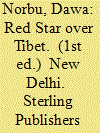

|
|
|
|
|
| Edition |
1st ed.
|
| Publication |
New Delhi, Sterling Publishers Private Limited, 1987.
|
| Description |
303p.hbk
|
| Standard Number |
8120702212
|
|
|
|
|
|
|
|
|
|
|
|
Copies: C:1/I:0,R:0,Q:0
Circulation
| Accession# | Call# | Current Location | Status | Policy | Location |
| 028253 | 951.5/NOR 028253 | Main | On Shelf | General | |
|
|
|
|
| 18 |
ID:
118141
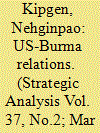

|
|
|
|
|
| Publication |
2013.
|
| Summary/Abstract |
The article analyses US-Burma relations under two different US administrations. Since the failed 1988 democracy uprising in Burma, the United States of America and the Union of Burma have had a strained relationship. This resulted in the US government's downgrading of its representative from ambassador to chargé d'affaires. The Republican administration of President George W. Bush pursued an isolationist policy by imposing sanctions on Burma from 2001 to 2009. When President Barack H. Obama took office in 2009, his Democratic administration embarked on a dual-track policy, engaging the Burmese leaders in a senior-level dialogue while continuing with sanctions. Although both the Republican and Democratic administrations pursued sanctions, the dual-track policy of the Obama administration was better received by the Burmese government. Democratic reforms within Burma played an important role in improving the bilateral relations under the Obama administration.
|
|
|
|
|
|
|
|
|
|
|
|
|
|
|
|
|
|
|
|
|